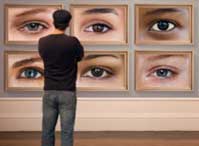Bell’s palsy is a disorder that affects the facial nerve (the seventh cranial nerve). Some 30,000-40,000 Americans suffer from this problem, which results in temporary or permanent decrease or loss of movement of the muscles of one side of the face.
Symptoms of Bell’s palsy, which are typically on just one side, may include:
- Face looks pulled to one side, feels stiff, or looks radically different from the other side
- Drooping of mouth or eyelid
- Difficulty closing eye
- Difficulty eating or drinking
- Drooling
- Facial twitching
A true diagnosis of Bell’s palsy is made when there is no identifiable cause for the muscle weakness. Sometimes facial muscle weakness is a result of swelling due to viral infection. HIV, Lyme disease, upper respiratory and middle ear infections and herpes zoster are all possible culprits. Viral symptoms may precede the onset of palsy symptoms by a few days. Other times, a tumor of the parotid (salivary) gland or, more rarely, the brain may be the cause.
To form a diagnosis, Dr. Yagoda will obtain a history, conduct a physical exam, and may order other blood and radiologic tests to rule out other causes. She might also conduct tests of facial nerve function.
Treatment for post-viral facial and Bell’s palsy may consist of watchful waiting (often, symptoms start to disappear on their own very quickly), with treatment of symptoms. For example, eye drops and lid taping during sleep may be necessary to help lubricate an eye that isn’t closing. A softer, non-liquid diet may help someone with difficulty chewing and swallowing. Medications like steroids aimed at reducing the swelling and other antivirals to fight the virus that’s causing the palsy may be prescribed. Although most cases of post-viral and Bell’s palsy resolve by themselves within a few weeks, it may take many weeks or even months for muscles to regain their strength. Dr. Yagoda can show you facial exercises that can help retrain muscles and speed recovery. Facial muscle weakness that is suspected to be the result of a tumor must be addressed surgically.
Long-term effects of facial palsy might include muscle spasms or eyelid twitches, muscle laxity, and changes in the way you eat, speak, kiss, and blow.
Because Dr. Yagoda is both an ENT and a facial plastic surgeon, she is very knowledgeable about the functional and aesthetic components of these conditions and their solutions. You can be assured that all your concerns regarding facial palsy can be managed with compassion, care, and consummate medical skill.



































